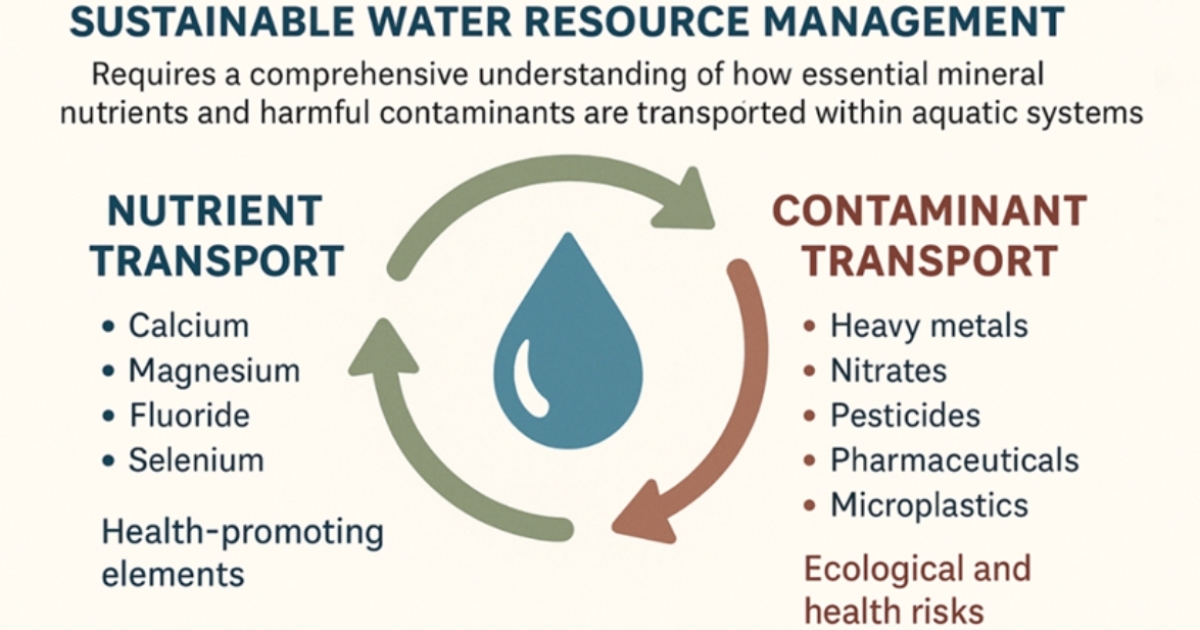Sustainable Water Resource Management: Controlling Nutrient and Contaminant Transport in Aquatic Systems

Topic Information
Dear Colleagues,
Sustainable water resource management requires a comprehensive understanding of how essential mineral nutrients and harmful contaminants are transported within aquatic systems. Water serves not only as a key carrier of health-promoting elements, such as calcium, magnesium, fluoride, and selenium, but also as a vector for pollutants that threaten environmental and public health. While mineral nutrients are critical for physiological functions including bone health, metabolism, and disease prevention, their spatial variability may lead to region-specific deficiencies or toxic accumulation. Simultaneously, the transport of contaminants, including inorganic compounds like heavy metals and nitrates, as well as organic pollutants such as pesticides, pharmaceuticals, and microplastics, poses serious ecological and health risks. These include carcinogenic, neurotoxic, and endocrine-disrupting effects, particularly under chronic low-level exposure scenarios. This Topic explores the mechanisms and drivers of nutrient and contaminant transport, aiming to inform sustainable strategies for water quality control. By integrating insights from hydrology, geochemistry, environmental engineering, and public health, it highlights the need for adaptive solutions that support both safe water access and long-term ecosystem resilience in the face of growing pollution pressures and water scarcity.
The list of specific topics covered in this Topic is as follows:
- Essential Mineral Nutrients in Water: Sources, Transport, and Health Implications.
- Aquatic Transport of Contaminants: From Heavy Metals to Microplastics.
- Geochemical and Hydrological Controls on Nutrient and Pollutant Mobility.
- Spatial Variability and Regional Risk of Nutrient Deficiency and Toxic Accumulation.
- Sustainable Water Resource Management under Pollution and Scarcity Stress.
Dr. Taotao Lu
Dr. Shuangcheng Tang
Topic Editors
Keywords
- water resource management
- nutrient transport
- contaminant migration
- aquatic systems
- water quality
- environmental health risks
- sustainable pollution control
Participating Journals
| Journal Name | Impact Factor | CiteScore | Launched Year | First Decision (median) | APC | |
|---|---|---|---|---|---|---|

Journal of Xenobiotics
|
4.4 | 6.0 | 2011 | 22.7 Days | CHF 1600 | Submit |

Sustainability
|
3.3 | 7.7 | 2009 | 17.9 Days | CHF 2400 | Submit |

Water
|
3.0 | 6.0 | 2009 | 18.9 Days | CHF 2600 | Submit |

Hydrology
|
3.2 | 5.9 | 2014 | 17.9 Days | CHF 1800 | Submit |

Biology
|
3.5 | 7.4 | 2012 | 16.8 Days | CHF 2700 | Submit |

Environments
|
3.7 | 5.7 | 2014 | 19.2 Days | CHF 1800 | Submit |

Preprints.org is a multidisciplinary platform offering a preprint service designed to facilitate the early sharing of your research. It supports and empowers your research journey from the very beginning.
MDPI Topics is collaborating with Preprints.org and has established a direct connection between MDPI journals and the platform. Authors are encouraged to take advantage of this opportunity by posting their preprints at Preprints.org prior to publication:
- Share your research immediately: disseminate your ideas prior to publication and establish priority for your work.
- Safeguard your intellectual contribution: Protect your ideas with a time-stamped preprint that serves as proof of your research timeline.
- Boost visibility and impact: Increase the reach and influence of your research by making it accessible to a global audience.
- Gain early feedback: Receive valuable input and insights from peers before submitting to a journal.
- Ensure broad indexing: Web of Science (Preprint Citation Index), Google Scholar, Crossref, SHARE, PrePubMed, Scilit and Europe PMC.



